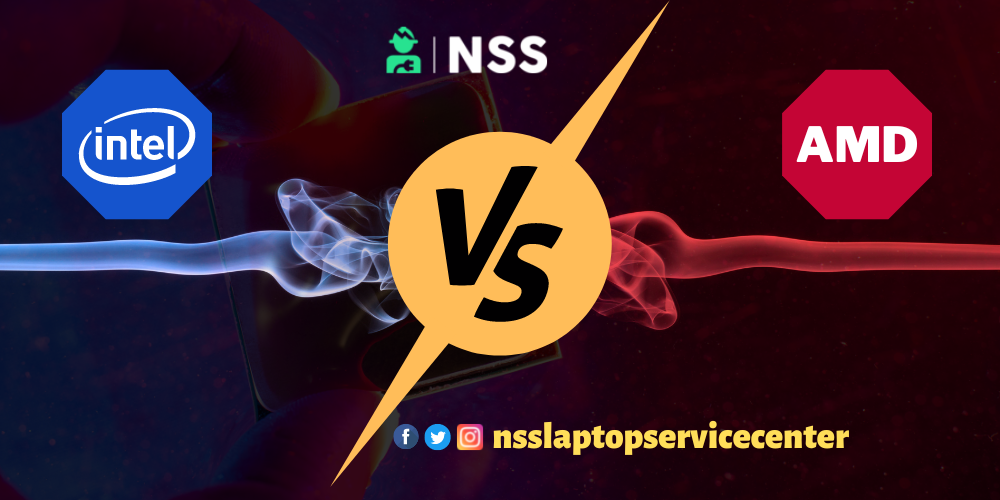
Choosing the right CPU and motherboard can be a difficult decision for the first-time build buyer. Many people don't know the difference between an Intel and AMD CPU or even the technical jargon - that's fine; that's why we're here! AMD and Intel both CPUs will provide you with good performance straight out of the box for regular online browsing. Here, we'll run you through the strengths of each brand and how the products compare in terms of performance and cost.
Table of Contents
AMD Vs. Intel - Which Is Better
Intel
"Integrated Electronics" is the abbreviation for Intel. Silicon Valley's Santa Clara serves as the corporate headquarters of the American multinational firm Intel Corporation. Robert Noyce is credited with creating it. It made the Intel 8086 the first x86 processor.

Intel processors rate a 4 out of 10 on a scale of 1 to 10. The CPU performance on these processors is good, and practically all Intel processors include an iGPU. Additionally, this processor runs at a faster frequency than AMD processors, albeit at the expense of shorter battery life. Therefore, newer Intel-powered computers can be employed for temporary workloads and single-core boosts when battery life is not an issue, especially laptops. Due to frequent motherboard and chipset updates, Intel processors have fewer alternatives than AMD processors if you want to modify the compatibility of your desktop's processor, motherboard, or socket.
Intel Xeon, Intel Core I series, and Intel Core M series, for instance
AMD

AMD is an abbreviation for Advanced Micro Devices. It is an international American semiconductor business headquartered in Santa Clara, California. Jerry Sanders, Jack Gifford, and John Carey created it. It began distributing x86 CPUs as a secondary source manufacturer and pitted itself against Am386.
AMD CPUs score a 5 to 10 on a scale of 1 to 10. In the same price range, it is less expensive than Intel Processors. Compared to the Core series of the current generation, these CPUs are efficient. Due to their strong GPU performance and comparable CPU performance to the Core I series, AMD APUs are also a suitable choice. Ryzen-powered laptops can be used when better GPU performance and longer battery life are preferred for laptops since they frequently clock lower and less aggressively than Intel-powered laptops, run more relaxed, and have longer battery life. However, because of their increased power consumption and heat production, older FX series CPUs and A-series APUs should be avoided when constructing a new desktop PC.
The Ryzen APU is the best option if you merely want to use your computer or phone for regular use and casual gaming. Ryzen 7 or 9 CPUs or Threadripper should be chosen for more demanding activities like video editing, 3D modeling, etc.
Although it can be readily fixed with motherboards supporting USB BIOS flashing for newer processors, the motherboard chipset should be checked for support for Ryzen Desktop CPUs and APUs in the AM4 platform.
AMD Ryzen, Threadripper, FX-Series, EPYC, Opteron, and Athlon 64 are a few examples.
Readers should know this article was created before Zen 3 and Alder Lake were released, but it may not reflect future modifications.
Difference Between Intel and AMD

Intel and AMD CPUs will give you good performance immediately for regular online browsing, Netflix viewing, and email replies. However, there are some tasks where one company's solutions outperform the competition.
Intel is the ideal option, especially for laptops, if you want to work with your CPU performing demanding multithreaded operations like video editing or transcoding or heavy multitasking activities with tens of browser tabs open. AMD isn't far behind Intel on the desktop
Pads on the Intel CPU's bottom.
If you use a desktop computer for work, leisure, or gaming, AMD and Intel will do you well. The Core i9-12900 KS is the most excellent CPU overall at the top end, but the Ryzen 7 5800X3D is what you need if you truly want to game at a frame rate of more than 200.
Until you reach high-power and high-performance laptops, Intel and AMD are good choices if you buy a computer. AMD can only produce 8-core CPUs, whereas Intel can produce 16-core CPUs. Therefore, AMD isn't necessarily inferior to Intel for high-end applications; they are currently nonexistent.
However, this is an intriguing period for AMD and Intel. Intel has tepid generations from AMD, and Intel is coming within a few months; it's probably best to wait on upgrading your PC until we have a clearer idea about how the next generation will play out.
Also Read: How To Watch Amazon Mini TV On Laptop
Also Read: How To Connect CM Delhi Free Wi-Fi In Laptop
Conclusion
I won't say much, as the blog has informed you about AMD vs Intel, which is better. It is an easy process, and you can use it for various purposes.
Frequently Asked Questions
Popular Services
- MacBook Battery Replacement Cost
- HP Printer Repair in Delhi NCR
- Dell Laptop Repair
- HP Laptop Repair
- Samsung Laptop Repair
- Lenovo Laptop Repair
- MacBook Repair
- Acer Laptop Repair
- Sony Vaio Laptop Repair
- Microsoft Surface Repair
- Asus Laptop Repair
- MSI Laptop Repair
- Fujitsu Laptop Repair
- Toshiba Laptop Repair
- HP Printer Repair Pune
- Microsoft Surface Battery Replacement
- Microsoft Surface Screen Replacement




